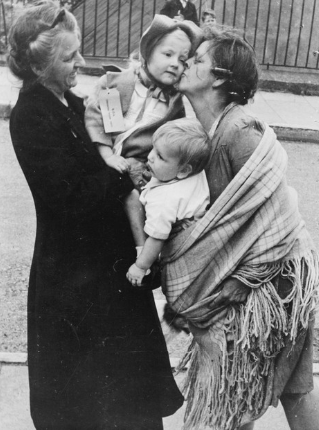Fred Baxter (1908-1997): War and Memory Post-War
As mentioned previously, so much of Fred’s memoir is spent reliving his experiences of both World War I and II, but in addition to this, he also dedicates time describing what life was like in the post-war period.
In 1945, after the conclusion of World War Two, the soldiers returned from the Western Front and Britain attempted to return to its pre-war state. However, the country was in turmoil making it impossible for people to resume the lives they once had prior to the outbreak of war. Many soldiers returned home unsure of what they would be facing. Fred questions, “Was I glad to be leaving? What was I going to do?” (p.23), almost doubting if he was in fact happy to be returning to his old life. This mixture of emotions was widely experienced in society. During the war, many people adapted to new roles, and when the war finished, it was difficult for them to transition back as “the war gave people a sense of place in the world and, increasingly with age, their identity” (Ingham, 2006, p.295).

Ordinary civilians also found the post-war years to be very difficult. During WW2, Bury St. Edmunds accepted “thousands of evacuees from London” (p.23). Many evacuees spent years away from home, living the majority of the war in the countryside, away from the dangers posed by living in towns and cities. After the war ended, it may have been upsetting for people to say goodbye to their newfound family. Furthermore, the families who had opened up their homes to the evacuees also found it difficult to readjust to life without their guests. This was certainly the case with Fred’s family, as he notes how “my wife was very good to the evacuees but after the war they went back to London and forgot about us” (p.23).
When Fred returned home, he was awarded with gratuity money and his service record stated he had been a “first class airman” (p.24). He recalls how “Bury Town council decided to have a street by street collection for a Welcome Home Fund” providing local people with the opportunity to show their appreciation for the ex-servicemen and the bravery they had shown during the war. It was even suggested that the “ex-servicemen might receive £25 each” (p.25). Fred and his fellow ex-servicemen were invited to meet the Mayor, Councillor Sewell, and were “anxious” to know how much they “were going to get each in cash” (p.25). Fred writes of his “shock” when the mayor broke the news that they would not be receiving cash but would instead “receive a parchment scroll valued at 10 shillings” (p.25). This must have been upsetting for the men, who had done so much to help their country in its time of need. Even the scroll did not materialise resulting in everyone being “disgusted with the outcome, even Counsellor Olle” (p.25). Unfortunately, after the Second World War concluded, some ex-servicemen felt discarded after doing so much in service to their country.

Bibliography
Work Cited:
Baxter, Fred, ‘Cemetery Side of 83 years; the life story of a Bury St. Edmunds man’, Booklet. 43pp. 1993, Burnett Collection of Working Class Autobiography, Brunel University Library.
Ingham, Mary. “Using the War: Changing Memories of World War Two, Oral History Society Conference, London July 2005.” History Workshop Journal, no. 61 (2006): 295-98.
Images Used:
Image 1- Evacuees return home to London. Photo shows villagers saying goodbye to the children they adopted for the war. Retrieved from:
Image 2- Welcome Home Fund, awarded by Hankelow and Cox Bank in Audlem. Retrieved from:

Leave a Reply